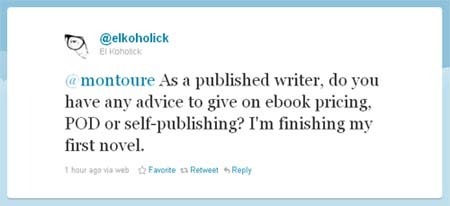Self-publishing, Pricing, and Print-on-demand
So this morning over on the Twitters, @elkoholick asked me a question:
. . . I said I thought that was a slightly wide-ranging question to answer in 140 characters, and promised that I would write up a blog post about it instead.
I suppose first off, I'd point you to a couple of things I've written before: "Making the Leap" is the introduction to my latest book, and it goes into some detail about my history with writing and publishing, and the road I took to making the decision to self-publish said book. You might also want to check out "Saying No to Ninety-Nine", where I talk about why some writers are pricing their e-books at 99 cents, and why I don't think it's a good idea.
. . . Okay, you've read those? All right, so, let's talk actual advice.
1. Figure out if you're honestly going to be satisfied with self-publishing.First off, I have to give the caveat that I don't have a ton of experience with traditional publishing — I've sold to some on-line markets, and had some small-press success, but the only time my work has appeared in what you'd call a Real Actual Goddamn Book was my story for "How the Doctor Changed My Life."
But, well, I've never really had a lot of interest in the idea of traditional publishing, either. Real publishing moves too slowly for me; I'm way too impatient. It can take years to place a book with a publishers, and maybe a couple more years after that to actually get your finished book into bookstores. Also, all the promotion that publishers used to do to advertise your books? Yeah, they don't really do that anymore, not in this economy, not unless you're Stephen King or Stephenie Meyer. New traditionally-published authors, and even established midlist authors, have to hustle just as hard as indies to make sure people find out about their books. So the way I figure it is, if I'm going to be the one doing all the work, I am sure as hell going to be the one keeping all the profit.
So that's my "victory condition" — making the most money off of my work, keeping all the control over the product. But that might not be your victory condition. You might end up deciding that what you really want is to have a "real" book, to have the legitimacy and respect of having a big publishing house behind you, to maybe see your book in bookstores. If you decide that's what you want, don't let anyone talk you out of it. You're playing your game, and no one else can decide for you if you're winning or not.
2. Keep your e-book prices down.99 cents is too low — you don't make any money and people are going to think your work isn't worth more than that. But they're not going to pay a lot more than that, either, not for someone whose name they don't recognize. You're going to want to publish through Amazon's Kindle store — that's really where all the action is — and $2.99 is the lowest price point where their royalty rate switches over from chicken feed to a decent 70%. Price your novel at $2.99. If you ever have a series of novels someday, a lot of people have had success at pricing the first one at 99 cents and the rest of them at $2.99 or higher. Something to keep in mind someday.
3. Print-on-demand is awesome. But don't expect to make any money at it. POD books used to be crap– cheap paper, a binding that would fall apart, a cover whose glossy plastic surface would start to peel at the edges. Those days are gone. The books you get from somewhere like CreateSpace look and feel practically indistinguishable from anything you'd pick up in a bookstore. And there is nothing like holding a physical book in your hands that has your name on it. They're wonderful. And people are not going to buy them.
If you suspect people might think twice about spending as much as $2.99 on an e-book from an unknown writer, then you know they're not going to plunk down $12-$15, plus shipping charges, for a physical book from said same writer. But, on the other hand, setting up your book on CreateSpace is free. So why not? Think of it as being there to be available in case anyone who loved your novel decides they have to have a copy to grace their shelves. Think of it as something that might make a nice present for your Aunt Millie. Or, if you do want to really sell a few of them, you can do what I do: order copies for yourself, at cost — it's pretty cheap to go that route — and sell them by hand. Sell them to your friends, sell them at readings, sell them at conventions.
4. People do judge books by their covers. If you're not an artist/designer — and I mean a good one — then you need to find someone who is. Your cover absolutely has to look good enough to compare favorably with a cover from a major publisher. People scrolling through lists of books on Amazon glance at each cover for literally less than two seconds before moving on. (They've timed it.) If your cover doesn't make them go, "Oh, hey, what's this?" then it's never going to matter how good your book is — people aren't going to look at it. Some cover that you think is just merely "good enough" is going to look like amateur hour to your potential readers. Get a good cover.
5. Oh, yeah, and your words matter, too. The words inside the book, natch — someone other than you will need to edit and proofread the damn thing, and you'll probably have to pay them. Having another set of eyes is crucial — believe me, I've done proofreading professionally for years, and I can't catch all the mistakes in my own prose.
The words in your book description matter, too. Again, just like your cover, a flat and uninteresting description on your Amazon listing will make a reader's eyes glaze over almost faster than they can hit the back button. Go look at some listings of your favorite books, see how their descriptions are written, study and replicate their structure.
6. Get ready to hustle. Remember all that promotion I was saying traditional publishers don't do any more? You have to do it. Don't worry, you don't have to buy ads in the New York Times and go on a multi-state book tour. But you do need to build a following, using every bit of social networking you can — Facebook, Twitter, Goodreads, and more. A lot of people put their book up on Amazon and sit back and wonder why it's not selling. Simple — it's not going to sell unless people know about it. And that's your job.
Well — that's about all I can think of off the top of my head, and probably enough rambling out of me for one day, anyway. Any questions?






